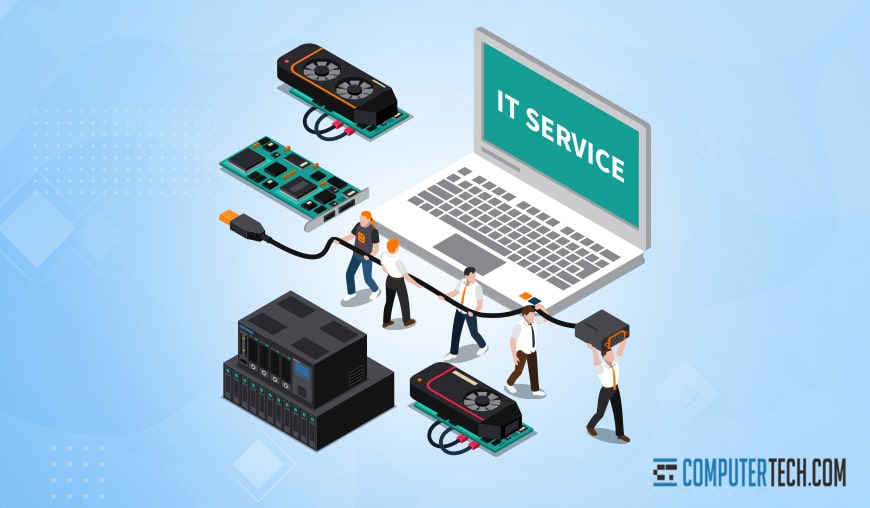-

Historically, IT is often considered a cost center for a business; a place where your money goes to be funneled into a bucket covered in question marks, and where the outcome of that expense is poorly conveyed.
Due to this pervasive opinion, particularly in C-levels and upper management, IT departments often end up stagnating. They may be forced to work with outdated equipment or software, they may lack the support staff necessary to handle your employees and customers, or they might simply just be too under-funded to attract the skills necessary to keep the business running.
IT is an “invisible” department in a company. When they’re functioning well, the company runs smoothly, issues are handled quickly, and many more problems are solved behind the scenes before anyone even knows they’re a problem.
Meanwhile, when an IT department is underfunded or poorly managed, the company suffers. A thousand small hassles add up; every delay in a computer program opening, every application crash, every time a mailbox fills up and delays communications, is a place IT could have streamlined a process but was unable to.
Perhaps more importantly, underfunded and understaffed IT departments tend to fall behind on software licenses, training, best practices, and other layers of defense. In our modern, internet-connected era of commerce, a business hack is far too commonplace. With the cost of cybercrime being what it is, funding IT seems like a no-brainer. All too often, however, executives take an “it’s never happened to me before, so we’re fine” approach while cutting budgets to save money for other operations, never realizing the cascading effect those decisions have on every part of the business that IT touches. To quote Entrepreneur:
“But a reality check is needed here because a company’s IT department should be one of its major profit drivers. A 2016 Deloitte Growth Enterprise Services poll of 500 mid-market executives found that IT department leaders were responsible for 49 percent of technology adoption, compared to 36 percent a year earlier. IT departments are becoming more and more strategic, and technology is becoming a more reliable investment.”
The clearest solution to this problem is to learn what, exactly, IT does. The best lens with which to look at it is through an IT support company. When you contract out your IT support, what are you getting? What are you paying for, and what are the results you can expect?
What Is an IT Support Company?
An IT support company is also traditionally known as a managed services provider, or MSP. Typically, it is a company made of up IT specialists, ranging from help desk and service technicians to networking and administration architects, systems administrators, and hardware specialists.
IT support companies usually handle a wide variety of IT needs, for businesses both large and small. These needs can include on-premises hardware, software, and administration, as well as cloud systems, networking, and support.

Usually, a company will contract with an MSP to set up and handle their equipment, including the computers used by their employees, the networking and routing devices necessary to keep the business running, the cloud-based software and services that interface with the company, as well as handling user support within the company, support tickets and communication with cloud providers and software developers when something breaks, and even phone systems.
It’s one thing to say that they handle all of that, though, and another to put it into business-actionable terms.
What Does an IT Support Company Do?
IT support companies work with your business leadership to handle everything you need in terms of IT. What this means, specifically, varies from company to company. Some aspects they can cover:
Implementation of on-premises systems. Every modern company today has computers running large portions of its operations. Whether it’s sales teams using computers to manage sales calls, day-to-day operations handled by email, or operating the computers behind major healthcare or manufacturing machinery, IT is of critical importance.

This is the foremost “invisible” area in which an IT MSP can benefit a company. Every time an email fails to send, every time a computer runs slowly, every time a print job fails, that’s an area where IT could solve a problem and streamline the business. That value alone is worth the price of admission, as often as not.
Implementation and management of phone (VoIP) systems. Modern phone systems often run on a voice-over IP system, which means they are computer systems. The way they connect to the internet, manage and route calls, and even provide an answering service may be something handled by your IT department. Phone systems can also be very complex and specialized, meaning that a trained technician is required to manage them.

High-level analysis of IT needs and network structure. How do you know what your company needs? What computers should you buy for your staff? When your sales leader asks for a more powerful machine, do they need it? What is the model of your server, and is it powerful enough to handle your needs? Should you invest in Office 365 or Google GSuite? These kinds of questions all stem from a knowledge of two things: what your company needs to function, and what options are available on the market. At what point in the growth of your business should you upgrade your services?

Unless you want to spend your time familiarizing yourself with all things IT to make an informed decision, you need to have someone who can handle it for you. An IT support company can help you make those decisions.
Software license management. Certain software requires a license to use, and when used in a business, often there are multi-seat, team, or business licenses necessary to operate. While some companies, particularly cloud service providers, offer simple pricing plans, others like Microsoft have many different packages for different levels of service, often in different industries. Even simply managing these licenses can be a pain, as mismanagement can lead to anything from over-billing to service cancellation, causing business interruptions.

Support for employees with IT issues. Employees are using your computer systems to handle their day-to-day tasks, and there will always be issues. Issues can range from user error to system interruptions to unexpected bugs, and the only way to solve them is to have an IT specialist investigate. Sometimes they can train a user to complete a task the right way. Sometimes they can fix issues in configuration, either on a user’s machine or on a networking device, to fix a problem. Sometimes they need to deal with higher-level problems or even escalate an esoteric issue to the manufacturer or developer of the product or software having issues.

IT security monitoring. Digital security is just as, if not more, important than the physical security of your business premises. After all, a thief breaking into your office has to be physically present to do so, while a digital thief can be anywhere in the world.
Security monitoring helps prevent any number of threats, from phishing emails to bot intrusion to dedicated hacking attempts. When attempts are detected, action can be taken to pre-emptively ensure that systems are secure.

Disaster recovery. In the event of a disaster, whether it’s a crypto locker, a hacked database, or damage to physical systems, an IT support company can help the business recover. Good IT MSPs in New Jersey and elsewhere all maintain redundancies, mirrors, and backups to restore from in the event of a disaster. Anything short of massive physical damage should be recoverable in a matter of days, with the right setup. Without that IT support company, how long would it take your business to recover from your systems being corrupted?
Why Hiring an IT Support Company is a Good Idea
Generally, the number one benefit to any outsourced business process is saving money. Hiring an IT support company to handle your IT allows you to save on the hiring process, the training, the expenses associated with an in-house system, and more.
You get higher skill levels and higher amounts of training for a lower budget. Most of the time, an MSP will be able to assign an appropriately-sized team to your business within your budget, with all of the skills necessary to keep your business up and running. They are on call whenever their services are needed, they monitor your business to ensure your systems are functioning, and they handle support.

IT support companies are also good for scaling. As your business grows, so will your IT needs. You may graduate out of certain small-scale applications and into larger versions, and everything from the transition to the training requires support. You may simply need more agents available to handle the volume of support. An MSP has a staff sufficiently large that they can assign additional techs to your account with near-zero onboarding, ready to go as needed. As your business grows, your IT support grows with you.
Another top benefit of hiring an IT support company is their access to higher-level software they can use for your company. Your business might not be able to afford a license on a high-end cloud provider or service, but the MSP can; they split the costs across all of their clients while delivering high-end service to many businesses that otherwise wouldn’t be able to access it.
Convinced?
What to Look for in an IT Support Company
Reducing costs is always good, but hiring the cheapest possible IT MSP is going to do more harm than good, and eventually cost more to fix the problem than it would have cost to hire a good company in the first place. So, what makes a company good?

Industry Focus. Often, you will find that the overall market of MSPs is flooded, and so the best MSPs have chosen specialties. For example, rather than seeking out any possible MSP, you might seek out specifically a healthcare MSP for a hospital system, a Hospitality MSP for hotel networks, or a Retail MSP for your small business.
Finding an MSP that handles the same specialty as you do is extremely important. When they know your industry, they know your concerns. They know the kinds of threats and attacks unique to your industry. They know what kinds of systems you need to be using to succeed. They know how to support your users with the tasks they’re trying to complete. It’s the same reason why you hire people with specific degrees and experience for specific roles within your company.
Pricing and Packages. Budget is a primary concern for many companies, so it’s always going to be important to pay attention to the pricing of your chosen MSP. Pricing can vary wildly depending on geographic location as well. Thus, if you’re operating a business in New Jersey, it can be valuable to pick an IT support company based in New Jersey as well.
Portfolio of Services and Specialties. Is your business running primarily on Apple devices or Windows machines? Do you want to use the Microsoft Azure cloud or the Amazon AWS system? These kinds of questions are important, and making the decision can be difficult. A good MSP can help you make the decision. If you’ve already invested in one or another in your business, you want an MSP that is familiar with supporting that system and won’t try to transition you to another for their benefit.
The Support You Deserve
At the end of the day, your company needs smooth and functional IT support, no matter how you slice it. If you want a skilled, trained, and inexpensive solution, your best option is almost always going to be a contract with an IT support company.

Picking the right company is crucial, but so is ensuring that they have the budget, access, and authority to make the changes necessary to secure your business. If you’ve never worked with an IT support company before, it may be a shock to learn how much goes into it. Everything from your digital security to your day-to-day operations to your phone systems might need adjustment to be brought up to modern standards. A good IT support company can do that for you smoothly. Invest the time in picking one suitable for your business.
About The Author
Herman
Herman is the lead team member here at Computertech.com. He’s been in IT for over 20 years and has expertise in our various IT Services including Microsoft Azure, Microsoft 365, Microsoft Teams and even Computer Security.
No related posts.
IT Support | IT Services | IT Consultant | Computer Support
Speak to a Human (856) 347-2282
- Home
- About Us
- Services
- IT Support
- Managed IT Services
- IT Consulting and Strategy
- IT Security Services
- IT Infrastructure Services and Networking
- Help Desk and Onsite Support
- Communication and Collaboration
- Specialist IT Services
- Data Backup and Disaster Recovery
- Cloud Computing
- Optimizing Network Consulting Services
- Remote Monitoring and IT Management
- Business Computer Services and Consulting
- Blog
- Contact Us
Navigation- Home
- About Us
- » About Computer Tech
- » What To Expect
- Services
- » IT Support
- » Managed IT Services
- » IT Consulting and Strategy
- » IT Security Services
- » IT Infrastructure Services and Networking
- » Help Desk and Onsite Support
- » Communication and Collaboration
- » Specialist IT Services
- » Data Backup and Disaster Recovery
- » Cloud Computing
- » Optimizing Network Consulting Services
- » Remote Monitoring and IT Management
- » Business Computer Services and Consulting
- Blog
- Contact Us
[Guide] What Exactly Does an IT Support Company Do?
In need of IT Services or IT Support? Call us today at (856) 347-2282
About Us
Computer Tech is an IT Consultant \ Computer Consultant firm providing Computer Support, IT Support and IT Services in South Jersey, IT Support North Jersey, IT Services Delaware, IT Services New Jersey, Philadelphia Pennsylvania.
(856) 347-2282Get started:
Managed IT Services
Nationwide IT Support
Managed IT Support New Jersey- Pros and Cons of Outsourced SOC (Security Operations)
- How to Find and Eliminate Wi-Fi Interference in the Office
- 7 Tips to Wire Up an Office to Maximize Wi-Fi Speed
- Can You Still Recover Hard Drive Data if It’s Water Damaged?
- How New Technology Has Changed the Modern Workplace
- The Pros and Cons of Outsourcing Your IT Department
- Custom Gaming Installations for New Jersey Businesses
- Computer Installation in New Jersey – How Does It Work?
- How to Hire an IT Team to Build an Office Network
- The Benefits and Future of Remote IT Support for Businesses
Newsletter
Computer Tech, LLC.
105 Market Pl Suite 1, Glassboro, NJ 08028
(856) 347-2282
© Copyright 2025 HighTech Business Solutions. All Rights Reserved.



